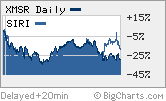 |
| Talk ain't cheap: It will now cost about $12.95 a month to hear Howard Stern on Sirius...but analysts think many fans will be more than happy to pay up for a Sirius subscription. |
|
 |
| Falling out of orbit: Shares of Sirius and XM have both taken a hit recently following analyst downgrades and concerns about subscriber growth. |
|
|
|
|
|
|
|
|
|
|
|
NEW YORK (CNNMoney.com) – He may be the self-professed King of All Media. But some on Wall Street are starting to wonder if Howard Stern really will be able to convince his loyal minions to pay to hear him.
Stern starts his new gig on Sirius Satellite Radio (Research) on Jan. 9, which means that his fans will have to buy a satellite radio receiver and then pony up $12.95 a month to keep hearing about the exploits of High Pitch Eric and Jeff the Drunk.
Stern's switch from terrestrial radio was supposed to mean good things for Sirius and its competitor XM Satellite Radio (Research), giving validation to these relatively new services.
But you wouldn't know that from the way the two stocks have performed lately.
Shares of Sirius have fallen nearly 10 percent in the past month and are down almost 14 percent this year. XM's stock has dropped more than 7 percent in the past month and has plunged nearly 25 percent year-to-date.
And several Wall Street analysts have downgraded Sirius and XM due to worries about subscriber growth. Last week, Banc of America Securities slapped a "Sell" rating on Sirius while J.P. Morgan downgraded XM to "Neutral" and Sirius to "Underweight."
Big fourth quarter so why the doom and gloom?
But are concerns overdone? After all, the fourth quarter should be extremely strong for both companies as satellite radio equipment and subscriptions have tended to be popular gifts.
"The stocks have historically run up during the Christmas selling season," said April Horace, an analyst with Hoefer & Arnett, also noting that both XM and Sirius expect good subscriber growth this season.
As such, XM's revenues are expected to more than double in the fourth quarter while analysts are predicting a nearly 200 percent surge in sales for Sirius.
To be sure, some fear that Sirius and XM are spending too aggressively to lure new subscribers. Stern, for example, signed a five-year $500 million deal to leave terrestrial radio.
Sirius has said that it would need Stern to bring in about 1 million new subscribers to break even on his contract.
But Susan Kalla, an analyst with Caris & Co. said that it would be "easily doable" for Howard Stern to help Sirius bring in about 7 million new subscribers over three years.
"I have no idea why the Street is underestimating Stern's ability to deliver new subscribers," she said.
Kalla thinks that Sirius will hit the 3.1 million subscriber mark by the end of this year and that the company will have 10.9 million by the end of 2008.
Other analysts said that Stern has helped raise the profile for its top competitor as well.
"It's hard to give attribution for subscriber growth simply to Howard Stern," said Stuart Kagel, an analyst with Janco Partners. "But let me put it this way. There are a host of people who had no idea about satellite radio prior to Howard and there are people who have decided to get it now."
Cash is king
In addition, both companies are getting closer to generating positive free cash flow, a benchmark that many investors have been patiently waiting for. The start-up costs for both companies (i.e. launching satellites) were massive and that's led to several years of red ink.
"This is a business where the infrastructure costs are invested up front and now Sirius and XM are at the point where they are finally able to capitalize on those costs," said James Goss, an analyst with Barrington Research.
Horace thinks both companies should be free cash flow positive by the end of next year although profitability on a net income basis is still several years away. But Horace adds that as more and more auto makers add satellite radio to their cars, this should lead to sustainable gains in subscriber growth, and eventually earnings, as well.
"Both companies are positioned very well for long-term growth," said Horace. "Satellite radio is becoming standard, factory-installed equipment in autos and most people listen to the radio in their cars."
Kalla said that investors may also be not taking into consideration that subscriber growth will also lead to advertising revenue.
Yes, both Sirius and XM tout commercial-free music as a selling point over terrestrial radio. But both companies do sell ads on some of their non-music stations. And as more and more listeners abandon traditional radio, Kalla expects advertisers to do the same.
"Ad dollars will follow subscribers," she said, adding that satellite radio ad sales, which currently represent about 1 to 2 percent of overall radio ad industry sales, could reach as much as 10 percent of the radio ad market within the next few years.
Of course, the shares of both companies will probably remain volatile. Goss points out that neither Sirius nor XM are "straight line stocks."
And David Bank, an analyst with RBC Capital Markets, thinks that XM is a better bet than Sirius because XM's market value is lower than Sirius' even though XM has about twice as many subscribers.
But with 2006 expected to be the year when both companies finally start generating cash, as opposed to bleeding it, it's likely that Sirius and XM won't have another down year.
Baba Booey.
For more about Stern's former employer Viacom, click here.
To read about why Mel Karmazin is having fun at Sirius, click here.
More Media Biz: To read why the Olympics won't be a flameout for NBC, click here.
Analysts quoted in this piece do not own shares of the companies mentioned and their firms have no investment banking ties to the companies.

|